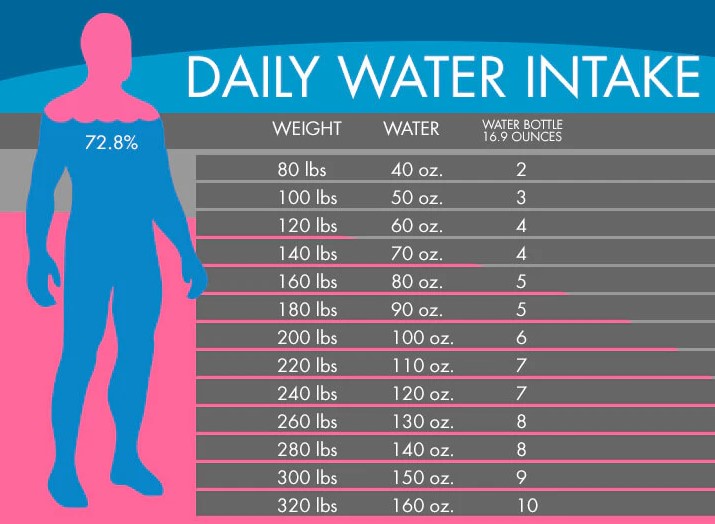BOURSESSENEGAL – Staying hydrated is crucial for overall health and well-being. But many people wonder, how much water should you drink a day? The answer varies based on factors like age, activity level, and climate. In this blog post, we’ll explore the recommended daily water intake, the benefits of proper hydration, and some tips to help you meet your hydration goals.
Understanding Daily Water Intake
To begin, let’s discuss the general recommendations for daily water consumption. The commonly cited guideline is the 8×8 rule, which suggests drinking eight 8-ounce glasses of water each day, totaling about 2 liters or half a gallon. However, the Institute of Medicine recommends a more personalized approach, stating that men should aim for about 3.7 liters (or 13 cups) and women should aim for about 2.7 liters (or 9 cups) of total water intake from all beverages and foods.
Factors Influencing Hydration Needs
Several factors can influence how much water you need daily. These include:
- Activity Level: If you’re physically active, you need more water to replace fluids lost through sweat. For every hour of exercise, consider drinking an additional 1.5 to 2.5 cups of water.
- Climate: Hot or humid weather increases your water loss through perspiration. Similarly, high altitudes can also cause dehydration, so be sure to drink more in these conditions.
- Health Conditions: Illnesses, fever, or infections can increase your need for fluids. Conditions like diarrhea or vomiting can lead to significant water loss, making hydration even more important.
- Diet: If you consume a lot of salty, spicy, or sugary foods, you might require more water. Foods with high water content, such as fruits and vegetables, can also contribute to your overall hydration.
Benefits of Staying Hydrated
Understanding how much water you should drink a day also involves knowing the benefits of proper hydration. Staying well-hydrated offers numerous advantages:
Improved Physical Performance
Hydration plays a significant role in maintaining physical performance. Even mild dehydration can impair strength, endurance, and overall exercise capacity. If you engage in physical activity, staying hydrated helps prevent fatigue and improves your ability to perform.
Enhanced Cognitive Function
Adequate water intake supports cognitive function, including memory and concentration. Dehydration can lead to brain fog, reduced alertness, and impaired decision-making. Drinking enough water can help keep your mind sharp.
Better Digestion and Nutrient Absorption
Water aids in digestion and helps break down food. It also assists in nutrient absorption, ensuring your body gets the essential vitamins and minerals it needs. Staying hydrated can help prevent constipation by promoting regular bowel movements.
Healthier Skin
Hydration contributes to healthy skin. When you drink enough water, it helps maintain skin elasticity, moisture, and a youthful appearance. Dehydration can lead to dryness and make your skin more prone to wrinkles.
Tips for Staying Hydrated
Now that we understand how much water you should drink a day and its benefits, let’s look at some practical tips to help you stay hydrated:
Carry a Water Bottle
Having a water bottle with you makes it easier to track your water intake. Opt for a reusable bottle to reduce plastic waste and refill it throughout the day.
Set Reminders
Use your phone or a hydration app to set reminders to drink water. Regular reminders can help you develop a habit of drinking water consistently.
Infuse Your Water
If plain water feels boring, try infusing it with fruits, vegetables, or herbs. Adding slices of lemon, cucumber, or mint can enhance the flavor and make drinking water more enjoyable.
Eat Water-Rich Foods
Incorporate foods with high water content into your diet. Fruits like watermelon, oranges, and strawberries, as well as vegetables like cucumbers, lettuce, and celery, contribute to your hydration needs.
Monitor Your Urine Color
A practical way to gauge your hydration level is by checking the color of your urine. Pale yellow urine indicates proper hydration, while dark yellow urine may signal dehydration.
Myths About Water Intake
Several myths surround the topic of hydration. Let’s address a few:
Myth 1: You Only Need Water When You’re Thirsty
While thirst is a natural indicator of dehydration, it’s not always the best measure. By the time you’re thirsty, you may already be slightly dehydrated. It’s wise to drink water consistently throughout the day.
Myth 2: All Beverages Count Toward Hydration
While most beverages contribute to hydration, some, like caffeinated drinks and alcohol, can lead to increased urination, which may offset hydration levels. It’s still essential to prioritize water as your primary source of hydration.
Myth 3: Everyone Needs the Same Amount of Water
As discussed earlier, water needs vary based on several factors, including activity level, age, and climate. Listen to your body and adjust your intake accordingly.
Conclusion
In summary, understanding how much water you should drink a day is essential for your health. Aim for about 3.7 liters for men and 2.7 liters for women, adjusting for activity level, climate, and personal needs. The benefits of staying hydrated are numerous, from improved physical performance to better skin health.
By incorporating simple strategies like carrying a water bottle, infusing your water, and consuming water-rich foods, you can ensure you meet your hydration goals. Remember, staying hydrated is a crucial step toward a healthier, more energetic life.
Now that you know how much water you should drink a day, take action and prioritize your hydration today!
REFERENCE : https://www.cdcfoundation.org/



